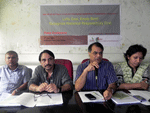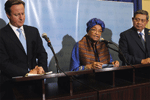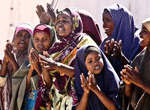Published on Tue, 2013-06-04 21:04
[Dhaka, Tuesday, 4 June 2013] Civil society right groups network EquityBD and VOICE in a press conference held at the city’s national press club criticized United Nation High Level Panel (UN HLP) report on post 2015 agenda terming it “as lofty goal and empty bowl” and said that the report is in fact a far short in transforming economies. The UN HLP report has just published on 30th June 2013 in New York. The UN HLP was co chaired by UK Prime minister Davide Cameron, Indonesian President Dr. Susilo Bambang and Liberian President Alen Johnson Sirlef. Moderated by Rezaul Karim Chowdhury, chief coordinator of Equitybd, the position paper was read out by Ahmed Swapan Mahmud, executive director of Voice. |
Published on Fri, 2013-05-31 13:44
(Montevideo, 31 May 2013) Social Watch, a network of civil society organizations in over 80 countries that monitor their governments compliance with international commitments, expressed deep disappointment with the suggestions of new development goals to replace the MDGs proposed today to the United Nations by a High Level Panel. The document is titled “A New Global Partnership” and the panel claims that, in preparing it, “we heard voices (...) from over 5000 civil society organizations working in about 120 countries” and “we also consulted the chief executive officers of 250 companies in 30 countries, with annual revenues exceeding $8 trillion”. |
Published on Thu, 2013-05-30 13:12
Despite the vision of the Somali Reconstruction and Development Programme (RDP), a pro-poor instrument and support from the international community, Somalia is unlikely to meet most, if any, of the Millennium Development Goals (MDGs) by 2015. Almost 66% of the population is living in severe poverty. Together with the rest of Horn of Africa, Somalia is now recovering from the worst famine in 60 years, affecting over one-third of its population, armed conflict continues in many areas of the country and the international aid system is unable to meet basic needs: 3.8 million are still in need of emergency aid. With the election of a reform-minded president and speaker of parliament at the end of 2012, will the country be able to overcome these challenges and improve people’s livelihoods? At a time when major breakthroughs were taking place in the field of development, including the release of first Human Development Report in 1990, Somalia was in its death throes. Moreover, the two decades of armed conflict that followed the state collapse in 1991 have taken a heavy toll on people, institutions, the economy and the environment. |
Published on Thu, 2013-05-30 12:55
Human rights have surged to the forefront of the debate about what will succeed the Millennium Development Goals in 2015. As human rights and social justice organizations worldwide, we feel compelled to lay out some of the baseline implications of embedding human rights into the core of the sustainable development agenda this time around. At its essence, a post-2015 framework anchored in human rights moves from a model of charity to one of justice, based on the inherent dignity of people as human rights-holders, domestic governments as primary duty-bearers, and all development actors sharing common but differentiated responsibilities. |
Published on Wed, 2013-05-29 00:00
United Nations independent experts today called on countries to ensure the post-2015 development agenda focuses on equality, social protection and accountability, noting that one billion people around the world are still living in poverty. “The rise of inequality has severely undermined the achievements of the Millennium Development Goals, or MDGs,” the independent experts said in their message to Member States which will meet this week in New York to discuss how to a shape a new set of global development goals for the period after the 2015 deadline of the MDGs. |
SUSCRIBE TO OUR NEWSLETTER







